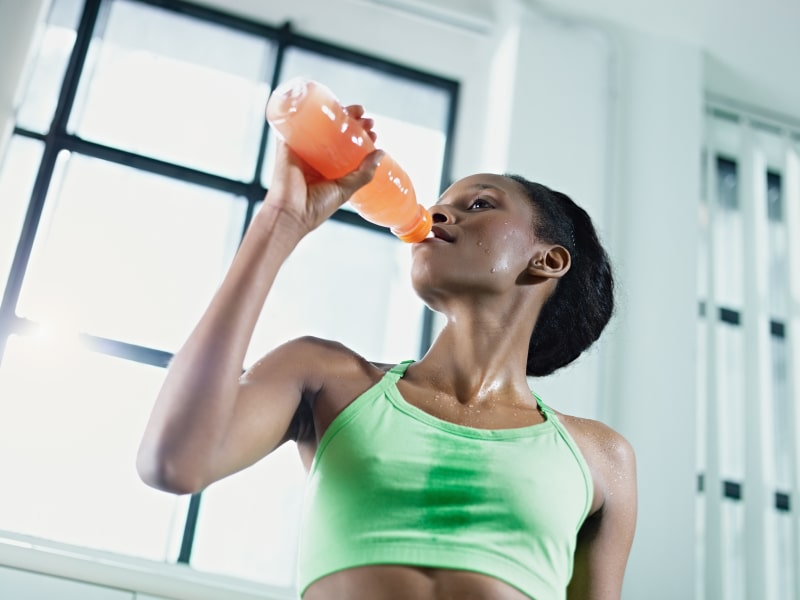Nutrition in Sports

A proper and balanced diet is actually more than half of an athlete’s success. The rules of nutrition in sport are very strict. A diet intended for an athlete who has to deal with intensive physical effort on a daily basis differs significantly from that of an average person. Both in terms of specific foods included in the diet and the need for calories per day.
An athlete’s diet should be planned by a dietician specializing in special nutrition, intended for people exposed to long-term physical exertion. Different dietary plans vary depending on the type of sport. It is obvious that a wrestler’s diet will differ significantly from a ski jumper’s diet plan.
Nutrients
The most important nutrient for every athlete is carbohydrates. They are an irreplaceable “fuel” that produces energy that the muscles use during exercise. Lack of a sufficient amount of carbohydrates in the daily diet can cause a decrease in form, lower productivity and energy loss. Therefore, a small meal containing a large portion of carbohydrates consumed before and after training is highly recommended.
Good carbohydrate sources are:
- dark, whole-grain and multi-grain breads
- wholemeal breakfast cereals and oatmeal
- pastries
- bananas and other fruits
- potatoes and maize
- rice, pasta, lentils
Another aspect that sportsmen’s nutritional plans focus on is the right amount of protein in the diet. Protein is the main building block of muscles. Athletes who aim to increase muscle strength and pure muscle mass must include more protein in their diet.
Despite the fact that the best and most valuable protein is delivered to the body through food products. To improve the effects, athletes often use additional dietary supplements containing protein. Most often it is whey protein and casein.
Natural sources of protein supplied with the diet are:
- lean
- eggs
- fish
- milk and yoghurt
- poultry – chicken and turkey
Simultaneous intake of protein and carbohydrates immediately after the workout will help the muscles regain strength and strengthen themselves. This dietary composition has an anti-catabolic effect – it prevents the breakdown of muscle tissue damaged by intensive exercise.
An appropriate diet is extremely important, both for professional athletes and amateurs. A carefully developed dietary plan allows you to achieve better sports performance, regain strength after training and support the regeneration process, maintain good health and strengthen the immune system.
Regardless of the sport, there are still the same questions among nutritionists and athletes as to what foods to eat, how much and when to consume in order to optimize their performance and prepare the body for intense exercise.
The dietary recommendations for athletes – whether professional or amateur athletes – can easily be explained by a dietary pyramid with water and irrigation drinks at the bottom, another vegetable and fruit, whole-grain products, milk and milk products, eggs, fat oils and nuts, and at the very top, various kinds of “snacks” Generally speaking, there are no “good” or “bad” foods.
It is about the variety and quantity of each type of food in the diet. The food pyramid helps to understand the amount of each type of food that should be included in the diet. Foods from lower levels of the pyramid can be consumed in large quantities, while foods from higher levels of the pyramid should be limited in quantity.

Monitoring the effectiveness of the diet
The best way to observe whether a specific diet is compatible with the sport and whether such combinations meet the expectations of the trainee is to keep meticulous notes, which can be supplemented with photos of the figure. It is worth keeping a dietary diary as well as once a week, twice a week, recording weight and measurements of specific body parts.
Photos taken at regular intervals give a more tangible example of the effectiveness of the diet. However, the examples described above are mainly used to determine changes in body proportions. What about people whose diet is supposed to influence the efficiency of exercises and their effectiveness?
Sports diet for amateurs
This is a good way to increase the performance of your training in the way that professionals do. By keeping an appropriate nutrition plan you can maximize your workouts, feeding your body in the right way. A good diet will not only give you more energy during exercise and improve your performance, it will also help you to take care of your overall health.
Most people burn considerable amounts of fluids while exercising. How much depends on the intensity of the workout, the environment and even the athlete’s genes. Drinking enough fluids before, during and after exercise will prevent dehydration. To verify the loss of water, it is worth to weigh yourself before and after training.
If there are less pounds, it is worth increasing the water supply, ideally take from 400 to 800 ml of water for every hour of training. If you weigh more after exercise, you can reduce your fluid intake a little. Carbohydrates are the main fuel that the body uses during exercise. People exercising at any level should take 50 to 60 percent of their daily calories from carbohydrates.
This helps to maintain body weight, health and performance during exercise. This also applies to professional athletes who train or compete in long races, such as half marathons or full marathons.
How much protein is needed depends on the type of exercise you do. It is worth receiving 15 to 20 percent of your daily calories from protein.
If you’re trying to gain lean muscle mass, strengthen your muscles or lose weight, it’s worth reaching for about 20 grams of complete protein as quickly as possible – right after exercise to help build muscle. The protein should be quickly digested and absorbed. The best is the protein found in milk and whey protein.
When it comes to diet, the same rules apply to amateurs as to professional athletes. A balanced diet is the consumption of high quality carbohydrates such as whole grains, fruit and vegetables, low fat protein sources such as lean meat, poultry, milk and healthy fats from natural sources such as nuts, olive oil and avocado.
Pre-trinnial nutrition
Athletes are always looking for ways to improve their performance and achieve their goals. Good nutrition can help your body achieve better results and regain strength faster after each workout. Optimal nutrient intake before exercise will help not only maximize performance but also minimize muscle damage.
The time of meal consumption before training is important. To maximize your training results, it is worth to reach for a full meal containing carbohydrates, protein and fat 2-3 hours before your workout. It should be remembered that the earlier you eat a meal before the workout, the smaller and simpler it should be.
In the case of eating 40-60 minutes before the workout, it is worth choosing products that are easily digestible and contain mainly carbohydrates and some protein. This will help prevent stomach discomfort during exercise. Carbohydrates help to maximize the body’s ability to use glycogen to fuel short and intensive exercise, while fat helps the body during longer exercise sessions.
Eating protein helps improve muscle protein synthesis, prevents muscle damage and promotes regeneration. Good hydration is also associated with improved performance. Pre-workout meals can be consumed from three hours to 30 minutes before training. However, you need to choose products that are easy to digest, especially if your workout is to start in an hour or so.
Nutrition is an integral part of sport. If you don’t pay much attention to it – you can’t count on positive and satisfying results of the work put into the exercises.
If you are not able to create a menu dedicated to the sports lifestyle on your own, it is worth asking for advice from a dietitian, who, after getting acquainted with the lifestyle and type of exercises performed, will help you to determine the need for calories and nutrients and create a sample menu for each day. Balanced nutrition is the basis of life for every athlete.




